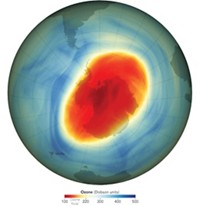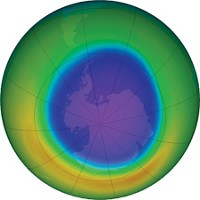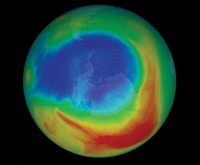Advertisement
Grab your lab coat. Let's get started
Welcome!
Welcome!
Create an account below to get 6 C&EN articles per month, receive newsletters and more - all free.
It seems this is your first time logging in online. Please enter the following information to continue.
As an ACS member you automatically get access to this site. All we need is few more details to create your reading experience.
Not you? Sign in with a different account.
Not you? Sign in with a different account.
ERROR 1
ERROR 1
ERROR 2
ERROR 2
ERROR 2
ERROR 2
ERROR 2
Password and Confirm password must match.
If you have an ACS member number, please enter it here so we can link this account to your membership. (optional)
ERROR 2
ACS values your privacy. By submitting your information, you are gaining access to C&EN and subscribing to our weekly newsletter. We use the information you provide to make your reading experience better, and we will never sell your data to third party members.
Climate Change
Ozone treaty holds down atmospheric CO₂ levels, scientists say
by Cheryl Hogue
August 30, 2021
| A version of this story appeared in
Volume 99, Issue 31

An international treaty to protect stratospheric ozone is slowing the growth of atmospheric levels of carbon dioxide, according to a team of scientists (Nature 2021, DOI: 10.1038/s41586-021-03737-3). The 1987 Montreal Protocol on Substances that Deplete the Ozone Layer is reversing loss in the stratosphere of the triatomic molecule that screens the Earth’s surface from the sun’s ultraviolet rays, protecting both humans and ecosystems from damage. One consequence is that land plants are healthier and able to absorb more CO2 for photosynthesis than they would have absent the pact, the researchers say. Led by Paul J. Young, an atmospheric scientist at Lancaster University in the UK, the team used computer models to estimate the benefits of avoided increases in UV radiation on terrestrial plants and their ability to act as a carbon sink. The researchers estimate that by 2080–99 the Montreal Protocol will lead to atmospheric CO2 levels that are lower by 115–235 parts per million than if the treaty didn’t exist. This translates to about 0.5–1.0 °C of average global surface temperature, they say.





Join the conversation
Contact the reporter
Submit a Letter to the Editor for publication
Engage with us on Twitter